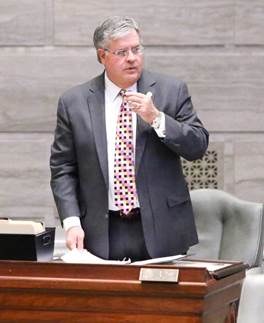Legislative News
The 2014 Legislative session wrapped up on Friday at 6 p.m. I’m proud to say the Senate tackled a number of high-profile issues this year, and worked diligently to resolves problems that have been affecting our state for years. Through compromise, honest debate, and public support, we were able to accomplish a number of notable achievements.
One of our biggest successes was the override of the governor’s veto of Senate Bill 509, a broad-based tax cut bill designed to encourage economic growth. It was the first time in almost a century the Legislature has provided significant tax relief to Missourians.

|
| Shown above, Sen. Richard, Majority Floor Leader of the Senate, guides the upper chamber through the final hours of the 2014 Legislative session on Friday, May 16. |
|
The bill will allow Missouri citizens and businesses to keep more of their hard-earned income. That money can then be reinvested in our economy through consumer spending, business expansion and job creation. The legislation goes far in creating an economic environment in our state conducive to long-term growth and prosperity.
We also completed a task legislators have worked toward for eight years now: revising Missouri’s outdated criminal code. Since the beginning of session, we made this one of our top priorities. We spent countless hours vetting each and every provision in the bill. The final legislation modernizes our criminal code, something that hadn’t been done since 1979. The reformed code will give prosecutors and judges the legal tools they need to ensure public safety in Missouri.
The Legislature addressed our state’s continuing problems with our crumbling roads and bridges. House Joint Resolution 68 that would put before a vote of the people a proposal that, if approved, would increase Missouri’s sales tax by three-fourths of one percent to generate revenue to repair our state’s roads, bridges, and local transportation projects. The resolution would also direct 5 percent of the revenue go to cities and 5 percent to counties for their infrastructure.
The health of our citizens was another major topic this year. One of the first measures passed out of the Legislatures was Senate Bill 668, which requires insurance companies to establish equal out-of-pocket costs for covered oral and intravenously administered chemotherapy medications.
We also passed House Bill 2238, which would patients with intractable epilepsy—individuals, including many children, who suffer from severe seizures that don’t respond to current forms of treatment—to take an oil extracted from hemp plants. CBD oil, as it’s known, has shown to be incredibly effective in treating the systems of this form of epilepsy. This bill will change the lives of hundreds, if not thousands, of families in Missouri who currently deal with a debilitating and heartbreaking disorder.
Senate Bill 639 would require doctors to advise women with dense breast tissue about the possible benefits of seeking out additional tests. This simple mandate could help save women’s lives. My wife Patty tirelessly advocated for the measure. I was grateful for her support, and to see this incredibly important bill reach the governor.
In addition, we approved Senate Bill 754, which extends the Mo RX Drug Prescription Program another three years, until 2017. The legislation was heavily supported by members on both sides of the aisle, who recognize the critical role this program plays in the health of our citizens.
In the November elections, citizens will vote on two resolutions approved this year. Senate Joint Resolution 36 would add an amendment to the Missouri constitution reinforcing the right of citizens to keep and bear arms. The amendment would also make these rights inalienable, and obligate Missouri to uphold these liberties and under no circumstance decline to protect against their infringement.
House Joint Resolution 90 would establish an early voting period for all elections except local, special district and municipal elections. The legislation would expand accessibility for voters and hopefully encourage more turnout in our elections. A strong democracy is built on citizen involvement. Allowing voters to cast ballots early, at their convenience, is a way to increase participation in government.
Both resolutions require voter approval to become law.
Other bills approved include House Bill 1132, which would increase the cap on the Pregnancy Resource Center, Food Pantry and Maternity Home tax credits and expand the Youth Opportunities Tax Credit to allow donations to programs that provide food for school-age children to eat during non-school hours, and House Bill 1307, which would increase Missouri’s current 24-hour waiting period for abortions to 72 hours.
These are just a handful of the bills sent to the governor this year. He has the option of signing them into law or vetoing them. Lawmakers will have the chance to override those vetoes in September during the annual veto session.
It’s been an honor serving the citizens of the 32nd District in the State Capitol this year. I’ll continue working on important issues during the interim. If you have any questions or concerns regarding our state government, please contact my office. Thank you.
District News
Prepaid debit cards may seem like an attractive financial option, but using one may cost you more than you think. There are some key differences between a prepaid debit card and a traditional debit or credit card. In many cases, those differences could cost you. Below are five important tips from the Missouri Credit Union Association to consider before using a prepaid debit card:
- Fewer Protections
If lost or stolen, debit and credit cards typically limit your personal liability. In comparison, prepaid debit cards offer no federal consumer protection laws limiting your losses. Users are only covered by issuers’ voluntary protections. Issuers can also reserve the right to change the terms of the contract at any time.
- Federal Insurance
Accounts at credit unions and banks are insured by the federal government – this means up to $250,000 of the money in your individual account is protected. However, prepaid debit cards are not automatically protected through federal insurance. This could put your prepaid debit card funds in jeopardy. Check to see if your prepaid card account is federally insured.
- Fees Can Be Costly
On average, prepaid card users are charged $300 a year in fees. When using a prepaid debit card, you may have to pay a monthly surcharge, charges to load funds onto the card, inactivity fees, and fees per transaction. These fees are not typical of a normal debit or credit card.
- Do Not Build Credit
Prepaid debit cards are not the best option if you are looking to establish credit or obtain a higher credit score. Since prepaid debit cards are not a loan and there’s no credit underwriting, these companies do not report to the credit agencies.
- Good Deals May Not Be So Good After all
Currently, each prepaid card company’s retail package discloses different information, which makes it difficult to do side-by-side comparisons. Also, this makes it hard to understand any associated fees and fee schedule.
It is highly recommended to talk to a financial institution before signing-up and using a prepaid debit card.
|



